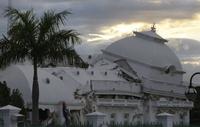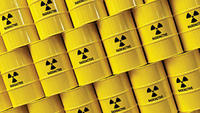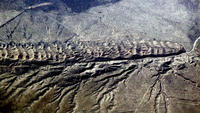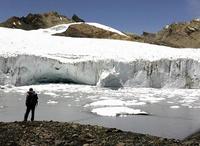-
Haiti's quake damage yields better building codes

In the aftermath of the 7.0 magnitude earthquake that shook Haiti last year and killed more than 300,000 people, University of Arizona researchers descended upon the country’s capital to study buildings that survived the quake; researchers documented damaged buildings to develop a sophisticated three dimensional model; they are working to develop stricter building codes to ensure that buildings can withstand earthquakes in the future; their focus is on designing low-cost easy to implement localized solutions; buildings that were not built to withstand earthquakes were the primary cause of death in the disaster
-
-
California Delta plan released, canal recommendation missing
Last week the Delta Stewardship Council released the first draft of its proposed plan to resolve safety concerns over California’s Sacramento-San Joaquin River Delta, one of the state’s most critical pieces of infrastructure; the Delta accounts for 76 percent of the state’s fresh water supply; engineers, residents, and politicians fear that the aging levees along the Delta will break in the event of an earthquake; missing from the initial draft is a recommendation for a peripheral canal, a controversial proposal that has sparked fierce debate; more details will be added to the plan in subsequent drafts after public meetings are held to debate its contents; the final draft of the plan is scheduled to be completed and adopted in November 2011
-
-
States challenge federal policy on nuclear waste storage

The search for a permanent solution to the storage of nuclear waste continues as three states sued the Nuclear Regulatory Commission (NRC) last week over its new policy on spent fuel; in December NRC issued a new policy stating that nuclear waste could be safely stored at a power plant for sixty years after a reactor went out of service; the issue of nuclear storage has become increasingly contentious after the Obama administration ruled out the use of a Department of Energy storage site in Nevada in 2009; nuclear plants have been forced to turn temporary on-site storage into long-term facilities as no permanent site has been built; the Obama administration launched a commission to find alternatives for the permanent nuclear storage site in Nevada that it cancelled
-
-
Industry wants current safety law extended rather than see it toughened
Before the House Homeland Security committee, Timothy J. Scott, the chief security officer of Dow Chemical Co., urged Congress permanently to reauthorize the Chemical Facility Anti-Terrorism Standards (CFATS) bill; under CFATS chemical facilities are required to address a range of critical security concerns including protecting facilities against attacks and preventing the theft of dangerous chemicals; currently, more than 35,000 facilities that use or store chemicals are required to meet CFATS regulations; DHS has worked with facility owners to mitigate risks with custom developed security plans at more than 2,000 “high risk” sites
-
-
Safer wind turbine developed to minimize DHS objections

In the past wind turbine farms have faced opposition from the Department of Defense (DOD) and the Federal Aviation Administration (FAA) due to the interference they cause radar systems; wind turbines distort radars causing air traffic controllers to see them as storms and the interference generated by the wind farms can even cause planes to disappear completely from radar screens; a new wind turbine model will help minimize the impact that wind turbine fields have on radars; the model will be used by various government agencies including DHS, DOD, and the Department of Energy to decide whether a proposed wind farm can move forward
-
-
Rising seas will affect major U.S. coastal cities by 2100
The Gulf and southern Atlantic coasts will be particularly hard hit by rising sea levels, research predicts. Miami, New Orleans, Tampa, Florida, and Virginia Beach, Virginia could lose more than 10 percent of their land area by 2100
-
-
Boston has new pot-hole weapons
In a typical year, the city of Boston fills about 19,000 potholes; the city now has two new pot-hole weapons in its arsenal: a $151,300 Pro-Patch Pothole Patcher truck, and a new iPhone and Android app, called Street Bump, which would automatically report potholes to the city by sensing when a car has hit a bump (the app has not been released yet, but test-drives are already being conducted)
-
-
Be prepared: earthquakes big and small

The February issue of the Bulletin of the Seismological Society of America offers insights into small seismic problems — and big ones — the United States faces; there were a series of small tremors in the Dallas-Forth Worth area — home to more than four million residents that has experienced no previous earthquakes in historic time; the Coachella Valley section of the San Andreas fault, between San Gorgonio Pass and the Imperial Valley, is the only portion of the fault which has not ruptured in a major earthquake during historical time; this is not good news: This long period of quiescence suggests that an unusually large amount of elastic strain has built up along the southern San Andreas segment, making it likely to produce a large to great (Mw7-8) earthquake in the near future
-
-
Hoover Dam is safe from hackers
In response to the debate over the controversial Senate Internet “kill switch” bill, the U.S. Bureau of Reclamation refuted a central argument that the law’s proponents have been using; proponents of the bill have often stated the need for the bill because terrorists could hack into the system and open the Hoover Dam’s floodgates; the dam is not connected to the Internet and has several physical and technological safeguards that prevent the floodgates from opening; the proposed bill would authorize the president to sever critical infrastructure from the Internet in the event of a cyber attack; critics say the bill could violate First Amendment rights
-
-
U.K. plans new body for the regulation of nuclear power
The United Kingdom is setting up a new nuclear regulatory body; the Office for Nuclear Regulation (ONR) would be a new independent regulator, formally responsible in law for delivering its regulatory functions and consolidating civil nuclear and radioactive transport safety and security regulation in one entity
-
-
Smart fence distinguishes real from imagined threats
A new sensor system can tell between someone simply leaning against a fence and a ne’er-do-well sneaking around; the device, developed by researchers at the University of Southern California, contains signal processing based on the way the brain works
-
-
Wind energy's dirty secret
Vast tracts of land have been turned into toxic wastelands to fuel the increasing demand for green energy; rare Earth metals like neodymium are critical components in wind turbines and electric cars, but the process to extract them is damaging to the environment; China, the world’s largest supplier of rare Earth metals, has largely ignored environmental considerations and left Inner Mongolia a widening sea of radioactive waste; the United States is currently ramping up production of rare Earth minerals, but is seeking to find more sustainable production methods; wind power still has fewer environmental repercussions than coal or oil
-
-
Controversial nuclear reactor design moving toward approval
A controversial new nuclear reactor design is moving ahead for approval by the U.S. Nuclear Regulatory Commission (NRC); the chairman of the NRC announced that the agency would open the design for public comment before deciding whether to approve the reactor; critics of the proposed reactor, a Westinghouse AP1000, believe that in the event of an accident its safety measures are inadequate; if approved, the reactor could be used in as many as fourteen nuclear power plants
-
-
Melting glaciers threaten Peru

Rising temperatures have caused glaciers in Peru to melt at alarming rates; Peru depends heavily on rivers fed by glaciers to provide drinking water, irrigation, and electricity; some scientists estimate that in ten years, whole glaciers will disappear entirely from the Andes; millions of Peruvians depend entirely on the glacier fed rivers as their primary source for water; the United States fears that water, food, and power shortages in Peru could cause stability and spark conflict across the region
-
-
Counterterror laws hobble monitoring of water supplies
Laws designed to protect the U.S. water supply are making it difficult for communities to maintain proper oversight over water companies and their use of water; the DHS has evidence that al Qaeda was looking to disrupt or contaminate the U.S. water supply; environmentalists who are concerned over water shortages or resource usage are having difficulty obtaining any information; officials admit that the laws are clumsy and are currently reviewing a system to make more data publicly available while protecting sensitive information like the location of wells
-
More headlines
The long view
Water Wars: A Historic Agreement Between Mexico and US Is Ramping Up Border Tension
As climate change drives rising temperatures and changes in rainfall, Mexico and the US are in the middle of a conflict over water, putting an additional strain on their relationship. Partly due to constant droughts, Mexico has struggled to maintain its water deliveries for much of the last 25 years, deliveries to which it is obligated by a 1944 water-sharing agreement between the two countries.
Trump Is Fast-Tracking New Coal Mines — Even When They Don’t Make Economic Sense
In Appalachian Tennessee, mines shut down and couldn’t pay their debts. Now a new one is opening under the guise of an “energy emergency.”
Smaller Nuclear Reactors Spark Renewed Interest in a Once-Shunned Energy Source
In the past two years, half the states have taken action to promote nuclear power, from creating nuclear task forces to integrating nuclear into long-term energy plans.
Keeping the Lights on with Nuclear Waste: Radiochemistry Transforms Nuclear Waste into Strategic Materials
How UNLV radiochemistry is pioneering the future of energy in the Southwest by salvaging strategic materials from nuclear dumps –and making it safe.
Model Predicts Long-Term Effects of Nuclear Waste on Underground Disposal Systems
The simulations matched results from an underground lab experiment in Switzerland, suggesting modeling could be used to validate the safety of nuclear disposal sites.
